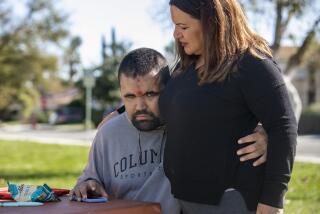Lindh’s defense alleges abuses
Attorneys for John Walker Lindh, the young American accused of fighting alongside the Taliban, said Tuesday that Lindh had been duct-taped naked to a stretcher, was showered with epithets by guards and suffered other harsh conditions at a Marine base in Afghanistan in the days before he was questioned by the FBI.
Lindh’s attorneys also insisted that he asked repeatedly for a lawyer while he was in Afghanistan and was denied one, contrary to the assertions of U.S. Attorney General John Ashcroft. An FBI agent told Lindh that “there were no lawyers there,” the attorneys said.
The claims were made in court papers filed in preparation for a court hearing in Alexandria, Va., to decide whether Lindh, 20, will be released on bond. Lindh’s father has offered to move to the area from California and act as his personal guardian if he is released, but that appears highly unlikely.
The Justice Department did not respond directly to the accusations of maltreatment. Instead Ashcroft held a news conference to highlight a grand jury indictment issued Tuesday against Lindh, making formal the criminal charges filed by prosecutors last month and adding several more.
The indictment supersedes the criminal complaint that brought Lindh to U.S. District Court in Alexandria, Va. The grand jury charged Lindh with conspiring to murder Americans abroad and providing support to terrorist organizations, including the Taliban and Al Qaeda. He also is charged with carrying a firearm during a violent crime.
The charges carry the possibility of multiple life sentences. Prosecutors had considered charging Lindh with treason, a crime punishable by death, but that offense is extremely difficult to prove in court.
`Bonds with al-Qaida’
Ashcroft condemned Lindh for “forging ever-deeper bonds with al-Qaida” and fighting “shoulder to shoulder with the Taliban.”
“The reasons for his choices may never be known to us, but the fact of these choices is clear,” Ashcroft said. “Americans who love their country do not dedicate themselves to killing Americans.”
The brief filed by Lindh’s lawyers, led by San Francisco attorney James Brosnahan, argued that Lindh should not be held pending trial because, they alleged, he is not a flight risk or a danger to the community.
In making these arguments, the defense lawyers provided a hint of Lindh’s likely courtroom strategy. They noted that despite the accusation that Lindh conspired to kill Americans, he joined the Taliban before Sept. 11 and before there was any indication he would be fighting U.S. soldiers.
“There are no allegations and no evidence that he ever intended or attempted to harm or did harm any civilian at any time,” the brief says. “Moreover, there are no allegations and no evidence that he ever so much as fired a shot, even at Northern Alliance soldiers.”
Most forcefully, the defense lawyers took issue with statements Lindh made to the FBI on Dec. 9 and 10 in Afghanistan, providing the basis for most of the charges. The lawyers argued that Lindh had suffered such trauma by then that his statements were unreliable and essentially coerced.
They laid out the supposed details of Lindh’s ordeal after his Taliban unit surrendered on Nov. 24 to Gen. Rashid Dostum of the Northern Alliance. Lindh and his fellow prisoners were shipped to a mud-walled fortress near Mazar-e Sharif. He was interrogated there by CIA agent Johnny Spann, who was killed shortly thereafter in a rebellion at the prison.
When the prisoner rebellion erupted, Lindh was hit by shrapnel or bullets and was helped into the fortress basement by fellow prisoners, where he remained with little food or water for a week, his lawyers said. During that time, Dostum’s soldiers threw grenades into the basement, poured burning oil into it and flooded it with freezing water.
Lindh saw fellow prisoners burning and drowning around him until he emerged from the basement Dec. 1 and was taken into U.S. custody, the brief says.
Lindh was flown a few days later to Camp Rhino, the Marine outpost 70 miles south of Kandahar.
“He was blindfolded and tightly handcuffed with plastic straps so tight that they cut into his skin and cut off the circulation,” Lindh’s lawyers wrote. “During the course of being transferred to Camp Rhino, Mr. Lindh’s government custodians threatened him with death and torture.”
Upon landing, Lindh was placed in a metal shipping container with no light or heat despite the frigid temperatures, they said. He received little food or medical attention.
“After approximately three days being held in these conditions, Mr. Lindh was led from the shipping container to a nearby tent and sat on a cot,” the brief continues. “When his blindfold was removed, he was facing a man who identified himself as an FBI agent. When Mr. Lindh asked for a lawyer, the agent told him there were no lawyers there.”
Neither side has said precisely when U.S. authorities became aware that Lindh was an American citizen.
U.S. defers response
Paul McNulty, the U.S. attorney for the Eastern District of Virginia, declined to respond to the allegations.
“I’m not in a position to address those kinds of issues today,” McNulty said. “There are a number of arguments that [Lindh’s] counsel may seek to make, in both this detention hearing context tomorrow and in further proceedings, and we’ll address those issues at the appropriate time.”
Still, the defense team’s accusations may cause trouble for the Justice Department. America’s European allies, as well as human rights groups, have expressed concern about the conditions under which the United States is holding its prisoners, and the Lindh document may provide more fuel.
More to Read
Sign up for Essential California
The most important California stories and recommendations in your inbox every morning.
You may occasionally receive promotional content from the Los Angeles Times.










